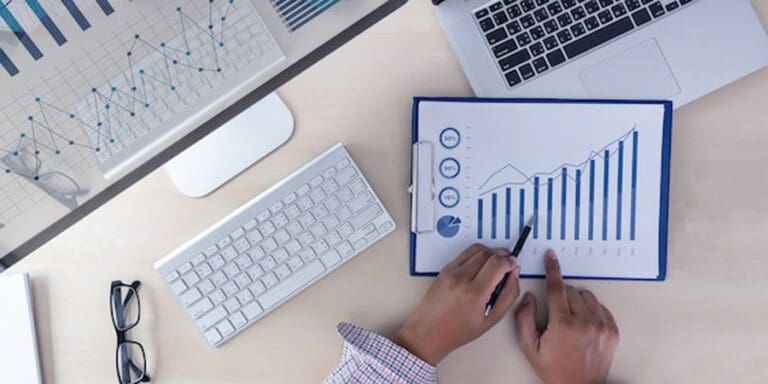Finance & Accounting Automation Must-haves for 2024

With the ongoing economic uncertainty, increased competition, and hiring concerns that have plagued the market over the past year, it seems that companies everywhere are looking to do more with less.
A great way to achieve that without sacrificing progress is by automating areas across the finance and accounting function.
While the specific processes an organization should automate will vary depending on their industry, size, and regulatory environment, even the simplest finance and accounting automations can be helpful for reducing human error, enhancing efficiency, and providing high-level executives with much-needed room to focus on strategic growth initiatives.
For a more detailed look into how industry-leading financial experts are fostering innovation through tech in 2024, head to our financial outlook report.
Top 5 Finance & Accounting Automation Must-haves for 2024
- Artificial intelligence and machine learning
- Blockchain integration
- Robotic Process Automation & digital invoicing
- Predictive analytics and integrated FP&A tools
- Cybersecurity and regulatory compliance automation
1) Artificial intelligence and machine learning for finance and accounting
Artificial intelligence can analyze huge amounts of data to provide accurate forecasts and information for budgeting purposes, risk management, and financial reporting.
Using AI-powered analytics, companies can make faster and more reliable decisions while fostering process efficiency at every level – from invoice processing and payroll to account reconciliations.
AI can also be used in many of the below technologies to further streamline progress and mitigate risk.
Ways to use artificial intelligence in the finance and accounting functions:
- Data entry and processing.
- Predictive analytics for financial forecasting and scenario planning.
- Fraud, cybersecurity, and other threat detection.
- Customer service and chatbots.
- Expense management and reporting.
- Supply chain automation.
- HR and workforce planning.
2) Blockchain integration for finance and accounting
Today’s growing organizations can utilize blockchain technology to keep transactions secure and transparent while reducing the risk of fraud and human error.
This type of finance and accounting automation also helps streamline the auditing process by creating an audit trail, reducing the amount of documentation finance and accounting teams must develop prior to auditing season.
Ways to use blockchain technology in the finance and accounting functions:
- Creating smart contracts to automate various processes (e.g. invoicing, payment approvals).
- Maintaining a transparent and secure record of financial transactions on a decentralized ledger.
- Driving faster and more cost-effective international transactions and cross-border payments.
3) Robotic Process Automation & digital invoicing for finance and accounting
Robotic Process Automation (RPA) involves automating repetitive, procedural tasks (e.g. data entry, invoicing, AP/AR) by using bots that mimic human behavior.
These bots operate 24/7, are incredibly scalable, and can easily interact with other applications like banking systems to provide more real-time visibility and control.
From financial closes to employee onboarding, RPA and digital invoicing are beneficial tools for organizations looking to enhance efficiency and accuracy across their finance and accounting functions.
Ways to use Robotic Process Automation & digital invoicing in the finance and accounting functions:
- Automatically extracting information from invoices (e.g. vendor details, amount, payment dates).
- Automating data entry and validating data against predefined rules to ensure accuracy.
- Comparing invoices with purchase orders and receipts to ensure consistent billing.
- Automating invoice approvals, notifications, and reminders.
- Automating expense report processing and management.
- Automating account reconciliations by matching transactions and identifying areas of correction.
4) Predictive analytics and integrated FP&A tools for finance and accounting
Another type of finance and accounting automation concerns the use AI and other tools to analyze historical financial data to create accurate and reliable forecasts, scenario plans, and reports to save time while mitigating risk and getting ahead of potential issues before they arise.
These analytical and FP&A automations also have the capacity to determine a company’s profitability while taking economic factors into account, providing a helpful solution for organizations looking to grow more strategically in today’s uncertain financial landscape.
Where to use predictive analytics and integrated FP&A automation in the finance and accounting functions:
- Cash flow forecasting.
- Financial consolidation.
- Trend analysis.
- KPI monitoring.
- Rolling forecasts.
- Expense management.
5) Cybersecurity and regulatory compliance automation in finance and accounting
Today’s increased reliance on technology also increases the need for robust cybersecurity measures that safeguard an organization from risk.
Automation and artificial intelligence can be used to help protect sensitive information from threat or unauthorized usage, reduce the risk of non-compliance, and empower organizations to proactively address risk.
Ways to use cybersecurity and regulatory compliance automations in the finance and accounting functions:
- Automating user account management, phishing email detection, cybersecurity training, multi-factor authentication, and more.
- Monitoring software vulnerabilities and applying patches.
- Keeping track of compliance and ensuring compliance with changing financial regulations.
- Validating data from different sources to ensure compliance.
- Generating compliance reports and other documentation for auditor or stakeholder review.
Final Thoughts on Finance & Accounting Automation Must-haves for 2024
There are many ways today’s growing organizations can utilize artificial intelligence and automation to save time, make their processes more reliable, accurate, and scalable, and empower innovation – and as these technologies are continuously developing, there will be even more ways to use them as we move into the coming year.
To begin understanding which types of finance and accounting automations are the right fit for your company, it can be beneficial to turn to a trusted partner for guidance.
Need Finance & Accounting Advisory?
Bridgepoint Consulting’s dedicated team of financial and accounting experts provide a variety of advice and support, including work in adherence, revised accounting standards, financial reporting processes and public company readiness.
Contact us today or learn more about how we can partner for growth at the link below.




